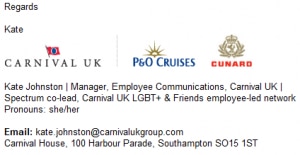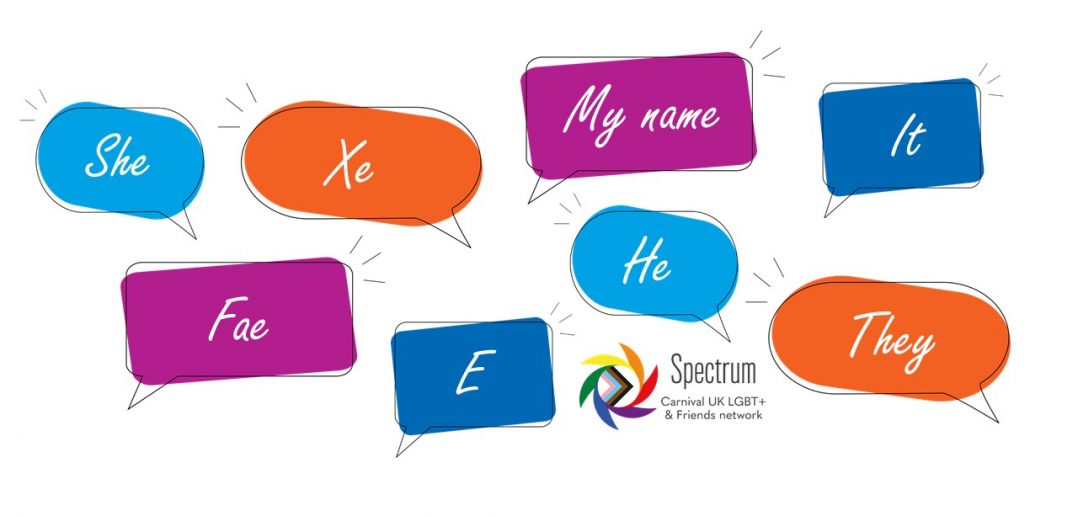February is LGBT+ History Month and Spectrum, Carnival UK’s LGBT+ & Friends employee-led network, is continuing to promote tolerance and raise awareness of the prejudices LGBTQIA+ people face. This week’s focus is on gender pronouns – what we use to identify and refer to someone, for example ‘they’, ‘he’ or ‘she’
Our identity is who we are, so how others address us has a really big impact on whether we feel like we belong. It’s not always obvious how someone likes to be addressed through pronouns. That may be because, for example, a person’s gender doesn’t sit comfortably with the sex they were assigned at birth, their gender identity is non-binary or because someone has a gender neutral name.
Describing people as ‘he’ or ‘she’ or groups of people as ‘they’ or ‘them’ is just the tip of the iceberg. What some people may not know is there are many valid gender-neutral pronouns that are becoming increasingly common. This would include the use of the singular ‘they’ or ‘ze’. An extensive list of more English gender-neutral pronouns in use are available on the non-binary wiki.
It’s time to talk about pronouns
At Carnival UK we’re committed to creating an inclusive workplace where everyone is welcome no matter how they identify. We can learn what pronouns someone uses just by politely asking them “Hey, what pronouns do you use?”.
However, we can make it even easier by all playing our part – that’s why we’re encouraging you to share your pronouns, and recognise the pronouns of your colleagues. Even if you are cisgender (cis) – your gender identity matches your sex assigned at birth – if you are comfortable with sharing your pronoun we need your support to start usualising the practice. By doing this you’ll help others accept that everyone is unique, and we should never make the default assumption that someone uses a ‘she’ or ‘he’ pronoun.
Make the first move when you meet with colleagues
You can take the lead by saying your pronouns when you introduce yourself at the start of a meeting. Not only will this encourage your colleague/s to do the same, but it will help everyone get used to talking about pronouns.
Add your pronouns to MyHR Portal:
Once you’ve logged in, on the left hand menu click ‘Personal Details’, then ‘Edit Demographic Info’. Under ‘Additional Options’ select ‘CUK’ and then you should have the option to select your pronouns from the list.
Add your pronouns to Teams:
It’s quick and easy to do; follow this guide here. By doing this you’re supporting us to usualise the use of pronouns and help others accept that everyone is unique and we should never make the default assumption that someone uses a ‘she’ or ‘he’ pronoun.
Add your pronouns to your email signature:
You’ve probably seen pronouns on Carnival UK email signatures already as a lot of colleagues choose to share their pronouns this way – as author of this article, and someone who includes their pronouns on their email signature, here’s mine as an example:

To add yours to your email signature in Outlook, follow these simple steps:
- Go to your inbox
- Click File > Options > Mail > Signatures.
- Click the signature you want to edit, and then make your changes in the Edit signature box
- When you’re done, select Save > OK.
Learn more about pronouns here.
It might take some getting used to, but it causes you no harm and using the right pronouns for someone will make them feel acknowledged and valid.
Mistakes happen
We want everyone at Carnival UK to be curious and to be confident when it comes to talking about belonging and inclusion topics. And it’s absolutely fine to get it wrong; mistakes happen, we just need to acknowledge them and correct ourselves.
So if you get someone’s pronouns wrong, please quickly apologise and use the correct pronouns. You can also show solidarity with someone who uses pronouns that others may mistake by politely correcting someone who has used the wrong pronoun, even when the person isn’t there.
If you use pronouns that some people may not automatically assume for you please remember to not compromise on them. Ask people to use them. Remember, at Carnival UK we’re committed to creating an inclusive workplace where everyone can bring their whole selves to work and belong, no matter how they identify.

